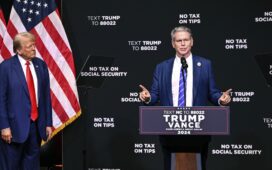Some see a high-water mark for inflation
Inflation in the U.S. was running at 8.5 percent in the year to March, new data showed yesterday, the highest level in more than 40 years.
Surprisingly, that brought an optimistic response from some of the economists who have spent the past year warning about price rises. “These numbers are likely to represent something of a peak,” said Gregory Daco, chief economist at EY-Parthenon.
Several market watchers see signs that inflation may be subsiding, The Times’s Jeanna Smialek reports:
-
A surge in gas prices accounted for much of the jump in prices last month. Strip out gas and food, as many economists do, and so-called core inflation actually decelerated from February to March.
-
Prices for goods that have been driving inflation recently, like used cars and consumer electronics, dropped or rose less than expected, a sign that snarled supply chains could be easing.
-
There’s also the “base effect,” a quirk of how the numbers are reported that can affect how much inflation there appears to be. Prices really began to pop last spring, which means that after spring this year, changes will be measured against a higher year-ago number, or base.
But policymakers aren’t sitting back. New Zealand’s central bank surprised economists with a larger-than-expected half-point interest rate increase today, a move that other central banks may follow. The central bank in Canada is expected to announce a big rate increase today, and the Fed and the Bank of England will probably do the same next month. (Britain’s inflation rate hit a 30-year high in numbers released today.)
And not everyone buys the “peak inflation” narrative. The data is not definitive, with the latest prices for some categories, like furniture, rising sharply. Wages are also up, raising costs for employers and potentially prompting them to continue lifting prices (and many workers’ paychecks are still not keeping up with inflation). Pandemic shutdowns in China threaten global supply chains and the war in Ukraine adds a huge dose of uncertainty.
HERE’S WHAT’S HAPPENING
A subway gunman is still at large in New York. The police identified a “person of interest” in the shooting of 10 people on a Brooklyn train yesterday. He appears to have posted lengthy, bigoted rants on social media, some criticizing the policies of New York City’s mayor, Eric Adams. The Times has a live briefing with the latest developments.
JPMorgan Chase kicks off the earnings season for big banks. It slightly missed expectations for its first-quarter profit, which was down some 40 percent from the same period last year, hit by some $500 million in losses on Russian assets and other war-related market effects. Earnings are scheduled tomorrow from Citigroup, Goldman Sachs, Morgan Stanley and Wells Fargo.
Airlines beat Wall Street forecasts as travel rebounds. Delta reported a narrower first-quarter loss and predicted a return to profit in the second quarter. American told investors yesterday that it expected slightly higher revenue than previously forecast. Boeing also reported a rebound in sales, with strong orders for the 737 Max.
Mark Zuckerberg says he will no longer donate to local election offices. He gave nearly half a billion dollars in 2020 to shore up voting infrastructure during the pandemic. Some conservatives claimed, without evidence, that the money helped President Biden win.
Lockdowns in China could sharply cut the global demand for oil. In its latest monthly assessment, the International Energy Agency said that China’s restrictions could ease the supply crunch caused by sanctions on Russia. Emergency reserve releases and increased production from the Middle East and U.S. may help, too, but the outlook is “mired in uncertainty,” the agency said.
Can tech companies lure workers back?
Tech companies have long been leaders in giving workers the flexibility to work remotely. But they have also spent billions on lavish office spaces that they see as crucibles of collaboration and creativity. And as the pandemic eases, they are trying to shift the balance back toward the office, using both carrots and sticks.
The Return of Return-to-Office Plans
After the Omicron variant crushed companies’ hopes for a return to in-person work late last year, a new R.T.O. chapter now appears to be opening.
The industry’s appetite for office space remains strong: Meta is planning to add roughly 300,000 square feet in Manhattan, and Google announced this morning that it is investing another $9.5 billion in U.S. offices and data centers this year, especially outside California in places like Atlanta, Austin, Pittsburgh and Portland.
Tech companies want their workers to be happy about returning, so they’re offering perks, The Times’s Daisuke Wakabayashi, Erin Griffith and Kate Conger report. The pop star Lizzo will perform for Google employees this month near the company’s headquarters in Mountain View, Calif. When Microsoft reopened its office, it offered live music, beer and wine tasting, and terrarium-making classes.
But many employees are dreading a full return. In New York, yesterday’s subway attack and an overall rise in crime on trains could increase concerns about safety. According to Nick Bloom, an economics professor at Stanford, one-third of workers he surveyed never want to go back. “Employees aren’t going to come in regularly just for the frills,” he said. The main draw is seeing colleagues.
Tech firms are making clear that in many cases returning to the office is mandatory. After several postponements, Google kicked off its hybrid work schedule April 4, requiring most employees in the U.S. at their offices a few days a week. Apple started easing staff back to the office on Monday, with workers expected once a week for now. Microsoft reopened its offices in Redmond, Wash., on a hybrid basis in late February.
“They’re not countering the pandemic. They’re creating disasters.”
— Ye Qing, a Chinese legal scholar who is known by his pen name Xiao Han, in an article that was quickly deleted. Many in China fear that the government’s costly “zero Covid” policy has become a Mao-style political campaign.
A pioneering executive is leaving Goldman Sachs
Maeve DuVally, a longtime communications executive at Goldman Sachs, is retiring from the bank in June after a nearly 18-year run. DuVally is not going far — she will advise Goldman Sachs as a consultant, focusing on both corporate communications and diversity and inclusion. Her retirement comes a little more than a year after Jake Siewert, the comms chief who led the firm’s reputation makeover after the financial crisis, left for Warburg Pincus.
DuVally broke boundaries. She came out as transgender during her tenure, a move the bank supported. DuVally recently recalled her decision: “Coming out at work was probably one of the happiest days of my life, and I’ve never looked back.” The bank’s current head of comms, Andrea Williams, said in a memo announcing DuVally’s retirement that “Maeve has been an important contributor to the firm’s LGBTQ+ activities, including client events and recruiting.”
She managed some tricky stories during the financial crisis, when the bank faced a deluge of criticism for its handling of mortgage-backed securities. “Maeve has worked on some of the most challenging stories about Goldman Sachs with a focus on protecting the firm’s reputation,” Williams wrote. DuVally joined Goldman Sachs in 2004 from Merrill Lynch and became a managing director in 2010.
DeFi’s control issues
Crypto developers working in decentralized finance, or DeFi, say that their automated platforms are governed by code, not people. But their premise of hands-off decentralization is being challenged by regulators, tech experts and aggrieved investors, most recently in a proposed class action lawsuit filed in New York federal court. The suit alleges that the founders and backers of a leading decentralized exchange, Uniswap, control the protocol and are liable for “rampant fraud.”
Are decentralized exchanges actually controlled by insiders? The complaint against Uniswap Labs and the venture capital firms Andreessen Horowitz, Paradigm and Union Square Ventures accuses the groups of unlawfully selling unregistered securities and leaving investors in the dark about risks that would have to be disclosed on a traditional exchange. “They will argue there is no person behind Uniswap and that it’s decentralized,” James Serritella, the plaintiff’s attorney, told DealBook. But people write the code that controls the exchange’s operations, and its governance system is designed to favor insiders, he argued.
Regulators have signaled their interest in this issue, with the S.E.C. chair Gary Gensler suggesting that DeFi platforms are not immune from oversight. The agency is reportedly investigating Uniswap, but Serritella said that lawyers must “bring these issues to the courts” because enforcers move slowly and investors are getting hurt. “These allegations are meritless and the complaint is riddled with factual inaccuracies,” a Uniswap Labs spokeswoman said in a statement to DealBook. “We plan to vigorously defend against this suit.” Paradigm and Union Square Ventures did not immediately respond to a request for comment; Andreessen Horowitz declined to comment.
If no one controls a program, no one is responsible if things go awry. A group of global market regulators recently studied DeFi services and concluded that they mostly “replicate more traditional financial services and activities, but with weaker regulation and increased risks for investors.” This “casts doubt on a key claim of DeFi innovators that it is a peer-to-peer marketplace with no centralized insiders in control,” the regulators found. That’s akin to the complaints made by Jack Dorsey, the Bitcoin enthusiast who co-founded Twitter and now runs Block (formerly Square), who has been sparring online with Marc Andreessen of Andreessen Horowitz.
THE SPEED READ
Russia-Ukraine war
-
Vitol, the world’s biggest independent oil trader, reportedly intends to stop buying and selling Russian crude by year’s end. (Bloomberg)
-
Russia’s tech industry faces a major setback as tens of thousands of workers flee the country. (NYT)
-
“The Incredible Bouncing Ruble” (Project Syndicate)
Deals
-
BlackRock and Fidelity joined a $400 million funding round for the stablecoin issuer Circle. (TechCrunch)
-
Credit Suisse has reportedly formed a “tactical deSPAC committee” to assess its involvement in blank-check deals ahead of new regulation. (Bloomberg)
-
GlaxoSmithKline is buying the drug maker Sierra Oncology for $1.9 billion, as it faces pressure from an activist shareholder to strengthen its drug pipeline. (Reuters)
Policy
-
A Twitter shareholder sued Elon Musk, accusing him of securities fraud. (Protocol)
-
Apple’s C.E.O. Tim Cook argued in a rare public speech that forcing the company to loosen its grip on its App Store would hurt consumers. (WaPo)
-
Google’s first consumer protection lawsuit is about puppy fraud. (NYT)
-
The C.F.P.B. sued the credit-reporting firm TransUnion and one of its former executives, saying they violated an order to stop using deceptive sales tactics. (NYT)
Best of the rest
-
McKinsey let its consultants simultaneously advise both drugmakers and drug regulators, according to internal records obtained by The Times. (NYT)
-
CNN’s streaming news platform CNN+ is off to a slow start and facing possible cuts, two weeks after launching. (Axios)
-
Substack wants to be more than just a self-publishing newsletter company. (NYT)
-
“The True Cost of a Bad Manager” (Quartz)
We’d like your feedback! Please email thoughts and suggestions to dealbook@nytimes.com.






